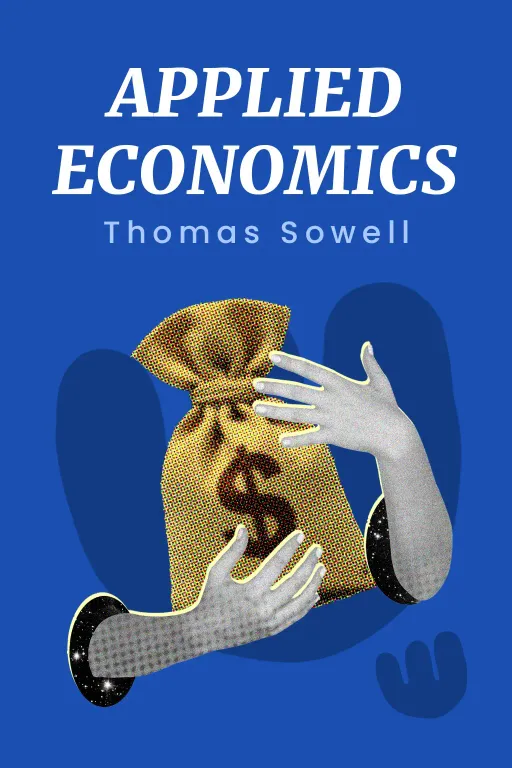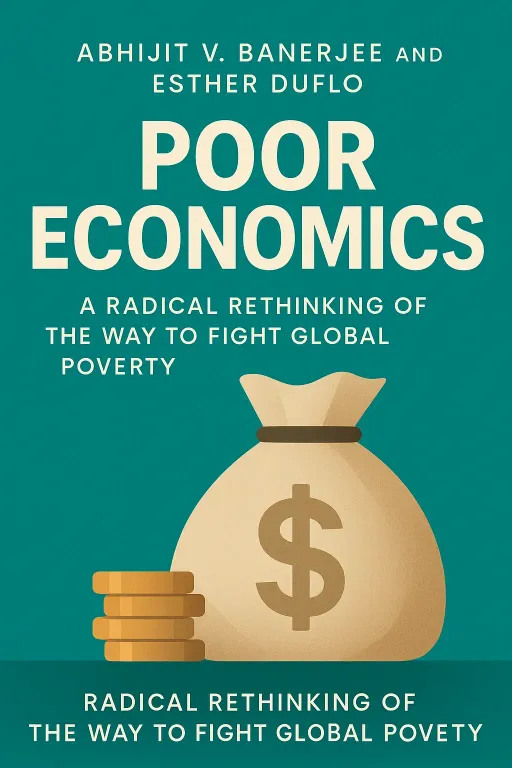
The Stage Two Startup: Applying Economic Principles to Build a Lasting Business
10 minGolden Hook & Introduction
SECTION
Socrates: Frank, let me ask you a question that every founder faces: are you building your startup to win the next board meeting, or to be a viable company in five years? It’s a choice between acting like a politician, desperate for re-election, or an economist, focused on sustainable reality. In 1971, President Nixon faced this exact choice. He was battling inflation, and his economists, like Milton Friedman, told him the painful truth about what was needed. Nixon’s response? 'I don’t give a good goddamn what Milton Friedman says. He’s not running for re-election.' That single decision, to prioritize the short-term win, offers one of the most powerful warnings for any entrepreneur today.
Frank Wu: Wow, that quote is chilling. It perfectly captures a tension that is so real in the startup world. The pressure to show immediate results, to get that next funding round, can be all-consuming. It’s a constant battle.
Socrates: It is. And it's the central idea in Thomas Sowell's fantastic book, "Applied Economics: Thinking Beyond Stage One." He argues that the most common and dangerous error in decision-making is to only look at the immediate, intended results of an action—what he calls 'Stage One'—and to completely ignore the long-term, unintended consequences. Today, we're going to unpack this from two angles, specifically for entrepreneurs.
Frank Wu: I'm ready. This feels incredibly relevant.
Socrates: First, we'll explore that 'Politician's Trap'—how the pressure for short-term results can kill a company, using Nixon's disastrous price controls as our case study. Then, we'll pivot and discuss the antidote: 'Investing in the Invisible,' looking at how building human capital, much like the sweat equity you pour into a startup, is the real key to long-term success.
Deep Dive into Core Topic 1: The Politician's Trap
SECTION
Socrates: So let's stay with Nixon for a moment. It's August 1971. Inflation is creeping up, the public is anxious, and there's a powerful cry for the government to "Do something!" The 1972 election is on the horizon. What does Nixon do?
Frank Wu: He ignores his economists, I'm guessing.
Socrates: He does more than ignore them. He actively defies them. Against their strenuous objections, he goes on national television and announces a 90-day freeze on all wages and prices. It was the first time such a thing had been done in peacetime America.
Frank Wu: And how did people react?
Socrates: They were ecstatic. It was seen as bold, decisive leadership. The media lauded him. His approval ratings soared. Stage One was a spectacular success. He went on to win a landslide re-election in 1972. A massive political victory.
Frank Wu: Okay, so that's Stage One. I'm waiting for the other shoe to drop. What happened in Stage Two?
Socrates: Exactly. The unseen consequences began to ripple through the economy. Sowell tells these incredible stories. Farmers started drowning their chickens and slaughtering young cattle. Why? Because the price of feed was rising, but the price they could sell their full-grown animals for was frozen. It was more profitable to kill them early than to raise them to maturity at a loss.
Frank Wu: That's insane. So the policy designed to make food more affordable was actually destroying the food supply.
Socrates: Precisely. And it didn't stop there. Supermarket shelves started to go bare. People couldn't find basic goods. Then came the gas crisis. The price controls on oil meant there was no incentive for companies to produce more or for consumers to use less. The result was predictable: massive shortages and cars lined up for blocks at gas stations. The policy didn't solve inflation; it just created shortages and chaos.
Frank Wu: It's a perfect example of treating the symptom, not the cause, and making the disease worse.
Socrates: Frank, as a marketing manager and co-founder, does this dynamic of a popular, visible 'Stage One' action hiding a disastrous 'Stage Two' reality resonate with the startup world?
Frank Wu: Absolutely. It's the siren song of growth hacking. For example, a software company might decide to make a core feature free to boost user numbers. Stage One: User growth explodes, the charts go up and to the right, investors are happy, it's a big win for the quarterly report.
Socrates: The political victory.
Frank Wu: The political victory, exactly. But Stage Two? You've just taught your market that your core value proposition isn't worth paying for. You've anchored your price at zero. It's a self-imposed price control, and just like with Nixon, the shortages—in this case, a shortage of revenue and sustainable profit—will eventually show up. You can't pay salaries with user-growth charts.
Socrates: So the 'demagoguery' that Sowell says 'beats data' in politics is like 'vanity metrics' beating 'unit economics' in a startup?
Frank Wu: That's the perfect analogy. Clicks, sign-ups, downloads... they're the popular vote. They look great in a press release. But profit, customer lifetime value, and churn... that's the economic reality. That's the data that determines if you survive past election day. Chasing vanity metrics is the fastest way to run your company into the ground while looking successful all the way down.
Deep Dive into Core Topic 2: Investing in the Invisible
SECTION
Socrates: That's a brilliant parallel. So if this kind of short-termism is the trap, Sowell offers an antidote: investing in things whose value isn't immediately obvious. This brings us to the economic idea of human capital. What's the ROI on an investment that might not pay out for years?
Frank Wu: It's the hardest thing to justify but often the most important. It requires faith in Stage Two.
Socrates: It does. And Sowell gives this beautiful, powerful example. Let's talk about an architect named Paul Williams. In the early 20th century, as a young black man, the number of opportunities for him in professional architecture was practically zero. It was a nearly insurmountable barrier.
Frank Wu: I can only imagine.
Socrates: He finally gets a job offer. It's a paying job, which for him at that time was a huge deal. But he turns it down. Instead, he takes a position as an unpaid office boy at a much more prominent, more prestigious architectural firm.
Frank Wu: He chose to work for free over a paying job? That's a huge risk.
Socrates: It's a massive Stage One sacrifice. He was giving up immediate income. But what was he gaining? He was investing in himself. He was acquiring what economists call 'human capital'—the skills, the knowledge, the network, the reputation—that he simply could not get at the other firm. He was playing the long game.
Frank Wu: He was thinking beyond Stage One. So what happened?
Socrates: The investment paid off spectacularly. Paul Williams went on to have a legendary, multi-decade career. He became known as the "architect to the stars," designing mansions for people like Frank Sinatra and Lucille Ball. He designed iconic buildings, banks, hotels, even the theme building at the Los Angeles International Airport. The immense wealth and success he achieved in Stage Two was built directly on that "unpaid" investment he made in Stage One.
Socrates: Frank, your company Aibrary is literally about turning books into personal growth, into human capital. How do you see this story of investing in the invisible relating to your mission and the journey of a founder?
Frank Wu: The Paul Williams story is the perfect embodiment of what we believe at Aibrary. Learning and personal growth is an investment in your own human capital. It doesn't always have a direct, immediate, measurable ROI. You read a book today, and the key insight might not become useful for six months, but when it does, it could be the thing that saves your company or unlocks a whole new market. It's the ultimate Stage Two asset.
Socrates: And for a founder specifically?
Frank Wu: For a founder, the first year is almost entirely 'unpaid' work in this sense. You're not taking a big salary, if any. You're pouring your time, your energy, your ideas into the venture. You're building the company's human capital—its code, its brand, its culture, its intellectual property. You're being Paul Williams, choosing the bigger long-term prize over the small immediate paycheck.
Socrates: So the 'sweat equity' of a startup is a form of human capital investment?
Frank Wu: Precisely. It's the belief that the knowledge and assets you're building today, which might look like nothing on a balance sheet, will have a massive payoff in Stage Two and beyond. It's the most fundamental act of faith in entrepreneurship.
Synthesis & Takeaways
SECTION
Socrates: So we have two powerful ideas from Sowell, translated for the startup world. First, beware the Politician's Trap—don't sacrifice long-term health for short-term vanity metrics that feel good now.
Frank Wu: Right. Don't implement your own price controls.
Socrates: And second, embrace the Paul Williams mindset—invest relentlessly in the invisible assets, the human capital of yourself and your company, because that's where true, sustainable value is created.
Frank Wu: I think the best takeaway for anyone listening is a simple question to ask every day: 'Is this decision for the press release, or for the balance sheet in three years?' It forces you to think beyond Stage One.
Socrates: A perfect filter.
Frank Wu: And if I could leave one challenge for everyone, especially those in a startup: look at your top priority for this week. The number one thing on your to-do list. Ask yourself, what is the potential unintended, Stage Two consequence of succeeding at this? Good or bad. Just asking that question is the beginning of applied economics for an entrepreneur. It's how you start building a company that lasts.









